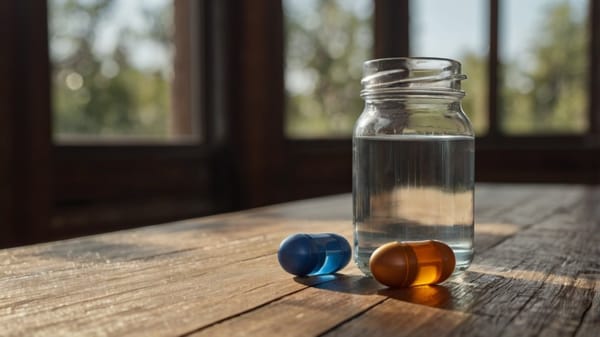Start Here if You Want to Stay Resilient More Often
Want to stay steady under pressure? This simple stack helps you bounce back faster, think clearer, and handle more—without burning out.

Ever wonder why some people handle stress like it’s nothing—while you feel wiped out by a single off day? It’s not about being tougher. It’s about how well your body recovers, adapts, and holds the line when life hits hard.
That’s resilience. And it’s not just mindset—it’s biology. With the right daily support, you can train your system to bounce back faster and stay steady longer. Here’s how to start building that edge from the inside out.
What Does Resilience Actually Mean?
Resilience isn’t just about handling mental stress—it’s a full-body system. Your nervous system, energy metabolism, inflammation levels, sleep quality, and hormone balance all play a role.
When they’re aligned, you feel steady, sharp, and adaptable. When they’re out of sync, you’re reactive, scattered, and slow to recover.
So staying resilient means protecting those systems and fueling them daily—before life throws curveballs. It's about staying ready, not just reacting when you crash.

Step One: Support Your Stress Response
Your body handles stress through a system called the HPA axis (hypothalamus-pituitary-adrenal). When it’s firing too often—thanks to long workdays, bad sleep, or constant pressure—you stay stuck in survival mode.
Adaptogens Help You Adapt
Adaptogens are natural herbs that train your body to handle stress more efficiently. They don’t block stress—they help your system return to balance faster.
- Ashwagandha is one of the most researched adaptogens for daily stress support. It helps lower cortisol, calm your nerves, and improve resilience over time.
- Rhodiola rosea is better for acute stress. It sharpens mental clarity and boosts energy when you're drained, without overstimulation.
You don’t need both. Pick the one that fits your current state. If you’re feeling burnt out, go with ashwagandha. If you’re dragging and need a boost, try rhodiola in the morning.
Step Two: Recharge Your Recovery Systems
Stress burns through key nutrients. And if you’re not restoring them, even sleep won’t help you bounce back.
Magnesium—The Recovery Mineral
Magnesium is critical for muscle relaxation, nervous system balance, and cellular repair. If you're always tense, can’t wind down, or feel sore longer than expected, there’s a good chance you're running low.
- Use magnesium glycinate in the evening to calm your system and deepen sleep.
- For workout recovery, magnesium malate can help replenish energy reserves faster.
Consistent use helps reduce stress-related fatigue and improves how quickly you recover from both physical and mental strain.
Step Three: Fuel Mental Clarity Without Crashing
When your mind’s resilient, you think clearer under pressure, focus longer, and don’t get thrown off by little things.
The L-Theanine + Caffeine Combo
Caffeine alone can create a spike-and-crash cycle—especially if you’re already running on stress. L-theanine changes that. It smooths the stimulation and increases alpha brainwaves (those calm, focused states).
Stack 100mg of L-theanine with your morning coffee or tea. You’ll feel alert but steady, not jittery. This combo works especially well for long work sessions, presentations, or high-pressure mornings.
Step Four: Build Long-Term Defense with Vitamin D
If you’re low on Vitamin D, everything becomes harder—mental energy, mood, immune strength, even hormone production. It’s one of the most common deficiencies, especially if you work indoors or live in a city.
Supplementing 1,000–2,000 IU of Vitamin D3 daily can make a huge difference. Pair it with your first meal for better absorption. Over time, you’ll likely notice more steady energy, better motivation, and fewer slow recovery days.
Step Five: Strengthen Your System While You Sleep
You don’t build resilience during the day. You build it at night. Deep, restorative sleep is where your body repairs tissue, balances hormones, and clears stress signals.
But if you’re tossing, waking up foggy, or still wired at bedtime, it’s a sign your nervous system isn’t shutting down like it should.
Tools That Help You Recover Overnight:
- GABA and magnesium glycinate help ease the mind and body before sleep.
- A wind-down routine with these supplements plus blue light blockers and no phone time? That’s next-level resilience.
- If sleep quality is your bottleneck, fix this first. It’s the difference between surviving and actually restoring.
What a Resilient Day Might Look Like
Here’s how this stacks up in real life—without overcomplicating things:
Morning:
- Wake up and hydrate
- Coffee + 100mg L-theanine
- Vitamin D3 with breakfast
Midday:
- Rhodiola (if needed for energy and clarity)
- Movement break or walk
Evening:
- Magnesium glycinate after dinner
- GABA or calming tea 30–60 min before bed
- No screens for the final hour
You don’t need to be perfect. You just need to be consistent. Most people feel better within a week when they start stacking their habits this way.
Final Thoughts: Build It Before You Need It
Resilience isn’t built in the moment of stress—it’s built in the quiet moments before. The supplements here aren’t quick fixes.
They’re long-term tools to help your body do what it’s meant to do: bounce back fast, stay clear under pressure, and keep showing up strong.
Start now. Pick one of these shifts and work it into your routine today. The earlier you start building resilience, the longer you stay ahead of the curve.




